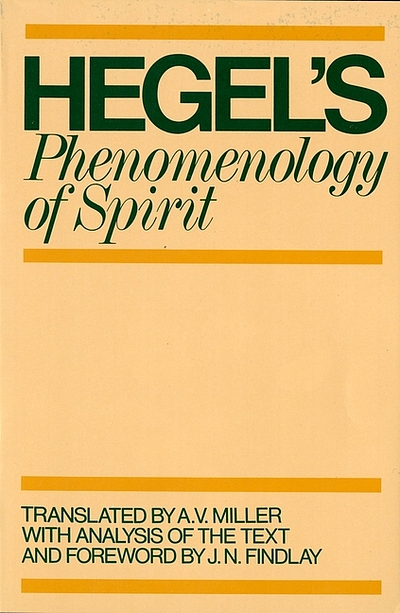I wrote and posted this on my old blog in the year 2020, several months into life with Covid-19. At the time I had the thought that I would start up a project of re-reading Hegel, and that I would write about it as I went along. I still come back to this thought and I think I will do it, or something like it, at some point.
Today is the 250th birthday of GWF Hegel. I first read him as an undergrad, and I hated him. I didn’t understand a word of it. I read him again in grad school, where I had an excellent teacher (Mary Rawlinson, at SUNY Stony Brook). I started to understand him. I continued to think about him and read him. I wound up teaching him to undergrads on a few different occasions, including taking on a (very ambitious) semester-long project of reading the entirety of Phenomenology of Spirit with an exceptional student who wanted to do an independent study.

Figure 1: The yellowish cover of the A.V. Miller translation of Hegel’s Phenomenology of Spirit
I cannot get away from this philosopher. In particular, I cannot get away from the Phenomenology. It is a wild, preposterous, brilliant, and infuriating piece of work. It makes the boldest claims, it has the audacity to follow through on many of those claims, and in those moments where it runs into trouble, it has the gall to act as if nothing happened and move on. No one writes books like this anymore (and really, no one should–we’re all set now).
Why do I spend time thinking about Hegel? This is a question I’ve been asking myself for years. It’s one my students ask me-–especially when we get to those moments in Hegel’s text where his politics around gender are most troubling. I don’t have a complete answer, and I don’t think I will. I am being sincere when I say that I sometimes wish Hegel had never written a word. The received interpretation of Hegel, the lazy interpretation of Hegel, does more harm than good, I think. We do not need anyone proclaiming “The End of History”. No one makes the world a better place for those who are really, truly suffering by insisting that History is one big march to some Perfect Endpoint. The so-called Thesis-Antithesis-Synthesis structure of the Dialectic means nothing at all, truly nothing, compared to the real and lived grief and rage and bewilderment of BIPOC communities in the so-called United States who are being plundered, gaslit, and murdered by their own government.
But there are, I think, some reasons to read and think about Hegel:
- Hegel is a damn good phenomenologist. If you want to sharpen your phenomenological skills, you’d be hard-pressed to find a better example to follow.
- Hegel spends more time showing us how to look than he does telling us what to think. In fact, in the Phenomenology Hegel almost never tells us what to think. This may seem unbelievable, but it is true. The whole conceit of the Phenomenology is that he will show us a radical way to examine our own experiences. This is a precious skill to cultivate, especially for those of us who long for meaningful, radical change.
- By aiming to show us every possible shape of human experience (a laughably unrealistic goal!), Hegel ends up showing us, oddly enough, quite a few shapes of human experience. And his radical analyses of these shapes are always illuminating. We’ll meet the famous characters in his text such as The Lord and The Bondsman, but we’ll meet far more than that: The Skeptic, The Stoic, The Knight of Virtue who tries so irritatingly hard to be good, the Idealistic Punk devoted to starting a movement to change the world and who is then overcome with frustration when no other collaborators seem to get it. We’ll meet parents and children. We’ll meet a shape of consciousness which can really only be described as “depressed” and yearning for some meaning or purpose in life. Perhaps in this last shape, more obviously than in any of the others, we can right away sense something else about this book:
- Hegel links the project of one’s own self-development (as a knower, as a feeler, as a be-er) to an ongoing and never ending confrontation with Death. The book can be a downer. “The way of despair” he calls it. But it is beautiful, too. And poignant. It raises the stakes of philosophical inquiry by giving it the most profound urgency. Lots of philosophers have attempted to impress this kind of urgency on their readers (as have so many philosophy professors attempted to do so on their undergraduate students), but few succeed, and I think the reason why is this:
- Hegel’s project fuses the epistemological with the ethical. The theoretical and the practical, the concept and the content, the ideal and the material. This text is, first and foremost, a damn good phenomenology. That means that it does not merely speak to, but is in fact rooted in, real living in the world. I think that you can forget that nonsense about Marx “standing Hegel on his head” as if Hegel didn’t think about the material world at all. He did! And if you read him, and take him seriously, and do the work, you will find that this is the case.
So. I’m going to start reading Hegel again. I’m going to read other things, too, because just reading a dead white guy, no matter how radical and thought-provoking, is not responsible. But I’m going to read and write with and around Hegel, in the hopes that I can continue to work at articulating why I am drawn to him, and how I think he can be useful.